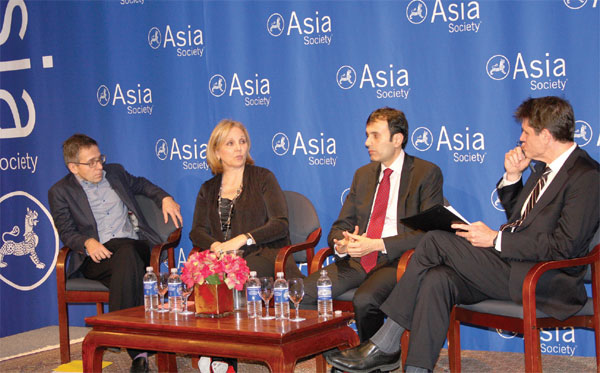Oil's fall 'huge gift' for China: expert
The impact of global oil prices and the advent of a new Silk Road trading route are some of the leading headlines coming out of Asia as 2015 approaches.
But as China and other Asian nations prepare for what the new year holds, a few questions remain.
"One of the biggest question marks in the world over the next five years is to what extent will China be successful at this massive economic transformation that they are undertaking, the scale of which is unprecedented," Ian Bremmer, president of the Eurasia Group, said during a panel discussion on Wednesday at the Asia Society headquarters in New York.
"Are they likely to be successful and have tailwinds through the next year? The answer is not only yes, but hell yes," he said.
Part of that, as Ian put it, is because of this huge gift of really low energy prices, because everything that China wants to accomplish is made easier by low input costs.
Among President Xi Jinping reforms are the rooting out of corruption at state-owned enterprises.
Josette Sheeran, president and CEO of the Asia Society, said China and the other leading economies in Asia have continued to connect with one another on a powerful global platform in 2014.
"In Asia, there's more strength than what is actually evident," Sheeran said. "China needs to slow down, and the country is probably going to come in for a soft landing, but China's economy has doubled in size over the past five years. That's the opportunity everyone is seeing."
"Ten years ago in China, everyone wanted to be Bill Gates," she said. "Today, everyone in America wants to be Jack Ma. And what does Alibaba represent? It represents connectivity without arbitrage."
Bremmer and Sheeran were joined by Ruchir Sharma, head of Emerging Markets and Global Macro at Morgan Stanley Investment Management, for a panel discussion titled, Asia 2015: The Experts Forecast.
Tom Nagorski, executive vice-president of the Asia Society, moderated the discussion as part of a year-ending segment to the organization's Asia: Beyond the Headlines series.
Other topics included the rise of the Indian economy, maritime disputes in Southeast Asia and the global threat posed by the Islamic State of Iraq and Syria (ISIS).
"When a country increases its debt very sharply over a short span of time, there is a very high probability that there is going to be a sharp slowdown in economic growth," Sharma said. "What country has had the biggest credit binge in emerging market history? It's China."
"There is no other economy that has seen such a large increase in its debt as a share of its economy," Sharma said. "Something has gone amiss in the last five years. China is still trying to grow at the 7 or 8 percent pace of a young sprinter, therefore it's relying on more and more debt to sustain that economic growth stream."
Sheeran said she views the opening of the new Silk Road as a "phenomenally huge shift" in trade patterns for Asian countries.
"I worry that the world is not understanding these strategic shifts that are happening and how countries like China are really coming along and changing the dynamics in a very deliberate way," she said.
|
Josette Sheeran, president and CEO of the Asia Society, speaks at a panel discussion at Asia Society headquarters in New York on Wednesday. Sheeran was joined by Ian Bremmer (left), president of the Eurasia Group; Ruchir Sharma (to Sheeran's right), head of Emerging Markets and Global Macro at Morgan Stanley; and Tom Nagorski, Asia Society's executive vice-president. Jack Freifelder / China Daily |

























